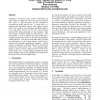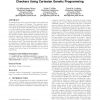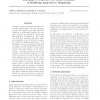43 search results - page 3 / 9 » Learning to Play Games in Extensive Form by Valuation |
COLT
2003
Springer
13 years 10 months ago
2003
Springer
A general class of no-regret learning algorithms, called no-Φ-regret learning algorithms, is defined which spans the spectrum from no-external-regret learning to no-internal-reg...
ATAL
2008
Springer
13 years 7 months ago
2008
Springer
In this paper we address the problem of coordination in multi-agent sequential decision problems with infinite statespaces. We adopt a game theoretic formalism to describe the int...
SIGCSE
2002
ACM
13 years 5 months ago
2002
ACM
Designing a two-person game involves identifying the game model to compute the best moves, the user interface (the "view") to play the game, and the controller to coordi...
GECCO
2008
Springer
13 years 6 months ago
2008
Springer
A developmental model of neural network is presented and evaluated in the game of Checkers. The network is developed using cartesian genetic programs (CGP) as genotypes. Two agent...
ICML
2003
IEEE
14 years 6 months ago
2003
IEEE
Learning in many multi-agent settings is inherently repeated play. This calls into question the naive application of single play Nash equilibria in multi-agent learning and sugges...



